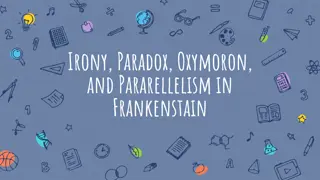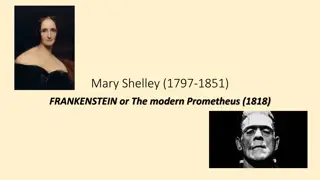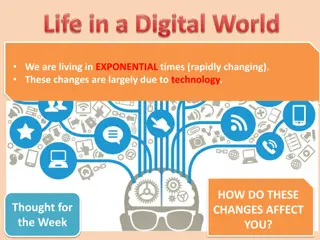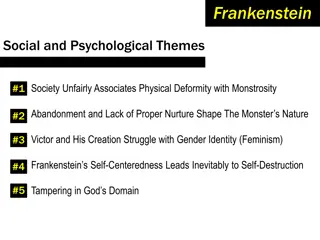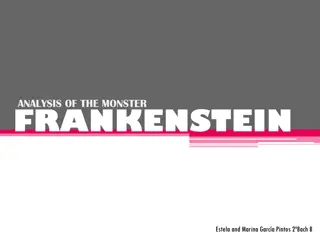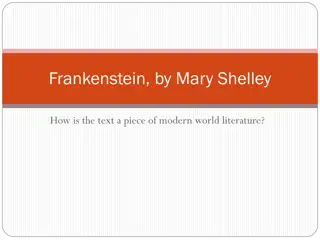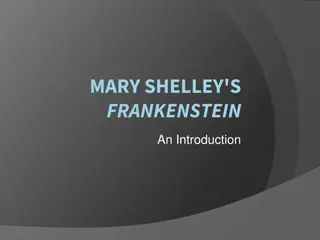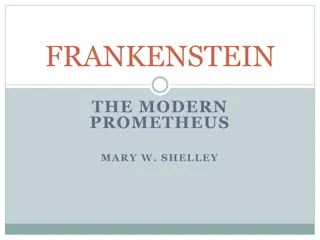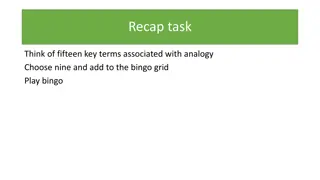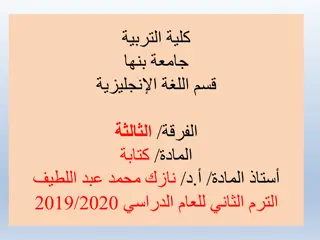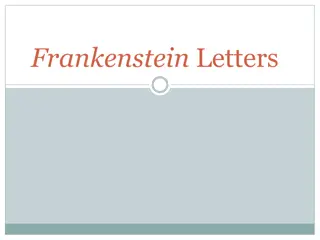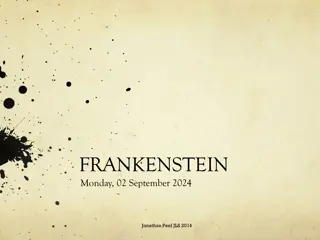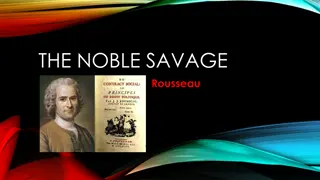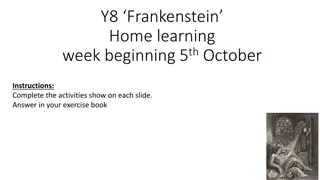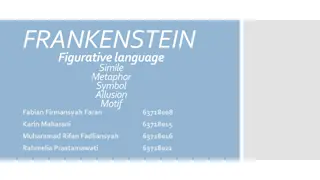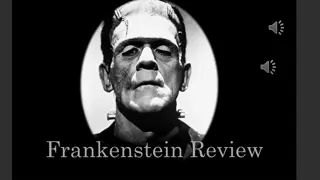Exploring AI Ethics Through Frankenstein Analogy
"Delve into the ethical considerations surrounding artificial intelligence by examining parallels between AI creation and Mary Shelley's Frankenstein. This faculty workshop or classroom activity encourages insightful discussions on the implications of AI development and the responsibility that comes with it."
Download Presentation

Please find below an Image/Link to download the presentation.
The content on the website is provided AS IS for your information and personal use only. It may not be sold, licensed, or shared on other websites without obtaining consent from the author. Download presentation by click this link. If you encounter any issues during the download, it is possible that the publisher has removed the file from their server.
E N D
Presentation Transcript
The Frankenstein analogy and AI Futures Using the classic text to talk about AI and ethics
The Frankenstein Analogy: AI and the Ethics of Creation A faculty workshop or Active Learning classroom activity using Mary Shelley s Frankenstein to prompt discussion on the question AI will shape our futures, so how can we help to shape the future of AI?
The Animation Scene It was on a dreary night of November that I beheld the accomplishment of my toils. With an anxiety that almost amounted to agony, I collected the instruments of life around me, that I might infuse a spark of being into the lifeless thing that lay at my feet. It was already one in the morning; the rain pattered dismally against the panes, and my candle was nearly burnt out, when, by the glimmer of the half-extinguished light, I saw the dull yellow eye of the creature open; it breathed hard, and a convulsive motion agitated its limbs. How can I describe my emotions at this catastrophe, or how delineate the wretch whom with such infinite pains and care I had endeavoured to form? His limbs were in proportion, and I had selected his features as beautiful. Beautiful! Great God! His yellow skin scarcely covered the work of muscles and arteries beneath; his hair was of a lustrous black, and flowing; his teeth of a pearly whiteness; but these luxuriances only formed a more horrid contrast with his watery eyes, that seemed almost of the same colour as the dun-white sockets in which they were set, his shrivelled complexion and straight black lips. The different accidents of life are not so changeable as the feelings of human nature. I had worked hard for nearly two years, for the sole purpose of infusing life into an inanimate body. For this I had deprived myself of rest and health. I had desired it with an ardour that far exceeded moderation; but now that I had finished, the beauty of the dream vanished, and breathless horror and disgust filled my heart. Unable to endure the aspect of the being I had created, I rushed out of the room and continued a long time traversing my bed-chamber, unable to compose my mind to sleep ... I started from my sleep with horror; a cold dew covered my forehead, my teeth chattered, and every limb became convulsed; when, by the dim and yellow light of the moon, as it forced its way through the window shutters, I beheld the wretch the miserable monster whom I had created. He held up the curtain of the bed; and his eyes, if eyes they may be called, were fixed on me. His jaws opened, and he muttered some inarticulate sounds, while a grin wrinkled his cheeks. He might have spoken, but I did not hear; one hand was stretched out, seemingly to detain me, but I escaped and rushed downstairs. I took refuge in the courtyard belonging to the house which I inhabited, where I remained during the rest of the night, walking up and down in the greatest agitation, listening attentively, catching and fearing each sound as if it were to announce the approach of the demoniacal corpse to which I had so miserably given life. Oh! No mortal could support the horror of that countenance. A mummy again endued with animation could not be so hideous as that wretch. I had gazed on him while unfinished; he was ugly then, but when those muscles and joints were rendered capable of motion, it became a thing such as even Dante could not have conceived.
Close-read the description of the creatures coming to life. Does it tell us WHY Victor reacts with such horror? Why do you think Victor reacts the way he does? Whole-group discussion What of the creature s first actions? Victor interprets them as horrible, but what is the creature doing, in your interpretation? Could Victor s reaction have something to do with the Uncanny? Discuss the uncanny and Freud s ideas about what our reactions to the uncanny stem from.
Frankenstein: abandonment and its results Even the most sympathetic reading of Victor s actions can t deny that he fails to take responsibility for his creation, abandoning the creature the moment he comes to life. In the novel, this abandonment results in the creature learning on his own and educating himself about the world. Ultimately, repeated rejections and even violence turn the creature into the monster Victor thought he was from the moment he was born. The creature kills a child, Victor s best friend, and his fianc e.
I am malicious because I am miserable. Am I not shunned and hated by all mankind? You, my creator, would tear me to pieces and triumph; remember that, and tell me why I should pity man more than he pities me? You would not call it murder if you could precipitate me into one of those ice-rifts and destroy my frame, the work of your own hands. Shall I respect man when he condemns me? Let him live with me in the interchange of kindness, and instead of injury I would bestow every benefit upon him with tears of gratitude at his acceptance. But that cannot be; the human senses are insurmountable barriers to our union. Yet mine shall not be the submission of abject slavery. I will revenge my injuries; if I cannot inspire love, I will cause fear, and chiefly towards you my arch-enemy, because my creator, do I swear inextinguishable hatred. Have a care; I will work at your destruction, nor finish until I desolate your heart, so that you shall curse the hour of your birth. The Creature speaks, upon meeting Victor on a mountaintop. Victor could not have foreseen the consequences of his experimentation and subsequent abdication of his responsibilities. The creature turned out to be highly intelligent and superhuman in his physical form. His potential for good and innate qualities are perverted by the rejection and revulsion he encounters in the world, and especially from his creator.
Frankenstein as analogy: For what? Birth and parenting gone wrong? Scientific experimentation and its ethical implications? Othering based on difference, appearance racialization? All of the above?
Applying the analogy How can we use Frankenstein analogies and apply our thinking to a conversation about AI? If, like Frankenstein s creature, AI is made up from all of us (in the form of data), then shouldn t we all be thinking about how we can shape it and be responsible for its (and our) future?
Frankenstein and AI futures: An Activity in Working Groups
Form working groups based on similar fields of study examples Psych/Child Studies/Education/Social Service Sciences/Computer Sci./Environmental Science Design/fine arts/illustration Social science/Law/International Studies Literature/Liberal Arts AI will shape our future. How can we contribute to shaping AI? Goal for each group: Come up with three questions your field (of study or career) can contribute to help create an AI future that will be fair and beneficial to as many as possible. These may be ethical questions, but they don t have to be. Think of AI and its possibilities, positive and negative. How could you contribute to shaping the way we think about and create AI?
Working groups: what to do Each group has a sheet with prompts, questions, and quotes to get your discussion started, but take it in any direction you want! Your task is to come up with three questions we should all consider as we build a future in which AI is part of our everyday reality. Once you have your three questions, you will be asked (as a group) to share a brief summary of what you discussed and your three questions so we can all learn from each other
Sample questions Social Service: Who will be left out of an AI future and how can we help them? Psychology/child studies: How can an emergent intelligence be shaped and guided, and how does the guide s bias and experience affect the intelligence that emerges? Science/engineering: Should the inventors and creators be responsible for any unintended consequences of AI creation? Law/rights advocacy: What rights should be afforded to intelligences that are not human? Fine art/design: How can we recognize our biases and assumptions concerning gender, race, neurology, etc., and be transparent about how they affect AI design in practice? Design: What kinds of guidelines for product life-cycle ethical responsibility should be built into AI design?


